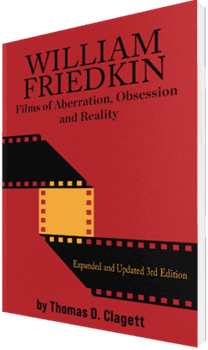William Friedkin: Films of Aberration, Obsession and Reality
William Friedkin’s Films: Contentious and compelling successes and failures. I’m often asked why I wanted to write a book about the films of William Friedkin. The answer is: I love movies; always have, and no one had done a thorough study of Friedkin’s films. I think “The French Connection,” “The Exorcist” and “Sorcerer” are three of the finest films ever made. These films, in my mind, are as important and as significant as Orson Welles’ “Citizen Kane,” David Lean’s “Lawrence of Arabia,” and Sam Peckinpah’s “The Wild Bunch.”
When I met William Friedkin at his office in Burbank in September of 1979 to discuss my proposal of a book on his films, he said he was not interested in participating “unless it’s honest, otherwise it’s just a waste of my time.” Relieved, I assured him that a serious study was exactly what I wanted to do. He then asked me what I thought of his films. I told him I had not yet seen his early documentary or television work.
Then I began naming off his films, telling him what I liked, did not like, and briefly why. I felt nervous. He had asked for honesty. It was too late to stop now, and I wasn’t going to lie to him. He sat behind his desk, listening quietly, never looking away from me. When I finished, he said, “That sounds fair. I’d agree with that assessment.” So began years of research for this book.
Friedkin, an Academy Award-winning director, long recognized for his dark, aberrant, visceral films, had a career that spanned more than 60 years (he died on August 7, 2023) and was marked by some of the most contentious and compelling successes and failures in American cinema. Among his successes are two very popular and highly regarded films, “The French Connection,” Oscar winner for best picture and best director, and “The Exorcist,” arguably the best horror film ever made, both considered classics of their respective genres.
His other films include “Sorcerer,” “Cruising,” “Deal of the Century,” “The Brink’s Job,” “Blue Chips,” “To Live and Die in L.A.,” “The Hunted,” “Bug,” “Killer Joe,” and his final film, “The Caine Mutiny Court-Martial.”
This insightful and engaging study of Friedkin’s films, which is based on nearly 100 interviews with the director and his colleagues, pays particular attention to the evolution of his cinematic style, his choice of subject material, and his unique vision–fatalistic, violent, realistic–as well as examining each film aesthetically, dramatically, and thematically.
 Tom has always had a love of the West, of film and of writing. Born and raised in San Diego, California, he attended the University of Southern California. He spent more than twenty years in Hollywood working as an assistant film editor, as well as freelance writing. Devoting himself to writing historical fiction full-time, he and his wife Marilyn moved to Santa Fe, New Mexico, where they adopted their cat, Cody, whom they are home schooling with great success.
Tom has always had a love of the West, of film and of writing. Born and raised in San Diego, California, he attended the University of Southern California. He spent more than twenty years in Hollywood working as an assistant film editor, as well as freelance writing. Devoting himself to writing historical fiction full-time, he and his wife Marilyn moved to Santa Fe, New Mexico, where they adopted their cat, Cody, whom they are home schooling with great success.








